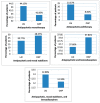Benzodiazepines and Mood Stabilizers in Schizophrenia Patients Treated with Oral versus Long-Acting Injectable Antipsychotics-An Observational Study
- PMID: 36831716
- PMCID: PMC9953951
- DOI: 10.3390/brainsci13020173
Benzodiazepines and Mood Stabilizers in Schizophrenia Patients Treated with Oral versus Long-Acting Injectable Antipsychotics-An Observational Study
Abstract
Schizophrenia is a chronic, invalidating, and polymorphic disease, characterized by relapses and remission periods. The main treatment option in schizophrenia are antipsychotics, administered as an oral or as a long-acting injectable (LAI) formulation. Although international guidelines rarely recommend it, mood stabilizers (MS) and/or benzodiazepines (BZD) are frequently prescribed as adjunctive therapy in schizophrenia patients for various reasons. This is an observational, cross-sectional study including stabilized schizophrenia patients. A total of 315 patients were enrolled. Of these, 77 patients (24.44%) were stabilized on LAIs and 238 (75.56%) patients on oral antipsychotics (OAP). Eighty-four patients (26.66%) had concomitant treatment with MS and 119 patients (37.77%) had concomitant benzodiazepine treatment. No statistical significance was observed in MS or BZD use between LAIs and OAPs. In total, 136 patients (43.17%) were stabilized on antipsychotic monotherapy. Our study shows that the long-term use of benzodiazepines and mood stabilizers remains elevated among stabilized schizophrenia patients, regardless of the antipsychotic formulation (oral or LAI). Patients receiving second-generation LAI antipsychotics (SGA-LAI) seem to be more likely to be stabilized on monotherapy compared to those receiving oral antipsychotics. Further randomized controlled trials are necessary in order to clarify the benefits of the current drug polypharmacy trends.
Keywords: antipsychotics; benzodiazepines; mood stabilizers; schizophrenia.
Conflict of interest statement
The authors declare no conflict of interest.
Figures
Similar articles
-
Time to rehospitalization in patients with bipolar mania discharged on long-acting injectable or oral antipsychotics.J Affect Disord. 2021 Jan 15;279:292-298. doi: 10.1016/j.jad.2020.10.023. Epub 2020 Oct 14. J Affect Disord. 2021. PMID: 33096327
-
Treatment Patterns, Health Care Resource Utilization, and Spending in Medicaid Beneficiaries Initiating Second-generation Long-acting Injectable Agents Versus Oral Atypical Antipsychotics.Clin Ther. 2017 Oct;39(10):1972-1985.e2. doi: 10.1016/j.clinthera.2017.08.008. Epub 2017 Sep 15. Clin Ther. 2017. PMID: 28919292
-
Long-acting injectable vs oral antipsychotics for relapse prevention in schizophrenia: a meta-analysis of randomized trials.Schizophr Bull. 2014 Jan;40(1):192-213. doi: 10.1093/schbul/sbs150. Epub 2012 Dec 17. Schizophr Bull. 2014. PMID: 23256986 Free PMC article.
-
Combination Psychotropic Use for Schizophrenia With Long-Acting Injectable Antipsychotics and Oral Antipsychotics: A Nationwide Real-World Study in Japan.J Clin Psychopharmacol. 2023 Jul-Aug 01;43(4):365-368. doi: 10.1097/JCP.0000000000001704. Epub 2023 May 23. J Clin Psychopharmacol. 2023. PMID: 37216369
-
[Long acting injectable antipsychotics in the treatment of schizophrenia: a review of literature].Riv Psichiatr. 2014 May-Jun;49(3):115-23. doi: 10.1708/1551.16905. Riv Psichiatr. 2014. PMID: 25000887 Review. Italian.
Cited by
-
Medication Dosage Impact on Mortality in Old-Age Individuals with Schizophrenia: A National Cohort Study.Pharmaceuticals (Basel). 2024 Jan 8;17(1):78. doi: 10.3390/ph17010078. Pharmaceuticals (Basel). 2024. PMID: 38256911 Free PMC article.
-
A Modeling Study for Hip Fracture Rates in Romania.J Clin Med. 2025 May 2;14(9):3162. doi: 10.3390/jcm14093162. J Clin Med. 2025. PMID: 40364194 Free PMC article.
-
Psychopharmacology and Biological Studies of Psychosis.Brain Sci. 2023 May 25;13(6):854. doi: 10.3390/brainsci13060854. Brain Sci. 2023. PMID: 37371334 Free PMC article.
-
Comprehensive characterization of chronic midazolam exposure on neonates and long-term neurodevelopment.Mol Psychiatry. 2025 Jul 9. doi: 10.1038/s41380-025-03104-y. Online ahead of print. Mol Psychiatry. 2025. PMID: 40634532
-
Global Neuropsychopharmacological Prescription Trends in Adults with Schizophrenia, Clinical Correlates and Implications for Practice: A Scoping Review.Brain Sci. 2023 Dec 20;14(1):6. doi: 10.3390/brainsci14010006. Brain Sci. 2023. PMID: 38275511 Free PMC article.
References
LinkOut - more resources
Full Text Sources



